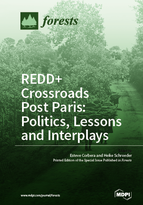REDD+ Crossroads Post Paris: Politics, Lessons and Interplays
A special issue of Forests (ISSN 1999-4907).
Deadline for manuscript submissions: closed (31 October 2016) | Viewed by 170311
Special Issue Editors
Special Issue Information
Dear Colleagues,
Reducing Emissions from Deforestation and Degradation, conserving and enhancing forest carbon stocks, and sustainably managing forests (REDD+), has become a reference framework for national forest governance across many tropical and sub-tropical forest countries. These countries have used funds from multilateral and bilateral aid platforms to re-organize their forest policy management and conservation programs around the idea of mitigating climate change, including the development of carbon accounting protocols and national REDD+ strategies.
REDD+ has become a powerful idea that has been mobilized by international conservation organizations and mainstreamed across the tropics through small-scale project activities, in order to capture the economic value of any resulting land-use emission reductions, mostly through voluntary carbon markets.
Research looking at REDD+ developments at both policy and practical levels, including critical inquiries of REDD+ countries’ strategies and on-the-ground project realities, has increased exponentially in recent years. This Special Issue aims to attract new evidence about three specific dimensions of REDD+ design and implementation that, in the view of the Guest Editors, remain both important and under-explored:
- Politics of REDD+ design and implementation
The issue welcomes articles about how governments are designing REDD+ strategies, and how different government and non-governmental actors are being involved in such discussions, and why or why not. Discourse analyses of REDD+ in host countries, including which rationales, views and values are being contested and constructed in the design of REDD+ national strategies, and how are conflicts mediated or coordination across actors pursued, are encouraged. Articles looking specifically at anti-REDD+ social movements and their success in influencing REDD+ design or halting implementation are also welcome.
- Interplays between REDD+ and other policy sectors
The issue expects articles investigating synergies and contradictions between the aims and policy programs conforming REDD+ national strategies and other land-use policies, including, but not limited to, agricultural and urban development policies. What degree of coordination, reform or even transformation across policies and sectors is being sought and achieved? Specifically, there is an interest in articles exploring if REDD+ is able (or not, and why) to transcend forest sector regulations in host countries, based on cross-sectoral and coordinated policy bodies and, more importantly, on the development of coordinated, rather than contradictory, development and land-use planning policies.
- Impacts of REDD+ activities
The Special Issue welcomes articles that focus on measuring the impacts of REDD+ activities, understood broadly as environmental and/or socio-economic and/or cultural changes, including new social conflicts and cooperation, resulting from REDD+ activities (policy programs and local projects) for specific environments, territories and peoples. These can include articles using quantitative and control-group based methods to investigate such impacts, as well as articles using qualitative, ethnographic data to explore how REDD+ activities, and specifically their carbon accounting dimension, has influenced resource access relations and existing conservation motivations and values.
Dr. Esteve Corbera
Dr. Heike Schroeder
Guest Editors
Manuscript Submission Information
Manuscripts should be submitted online at www.mdpi.com by registering and logging in to this website. Once you are registered, click here to go to the submission form. Manuscripts can be submitted until the deadline. All submissions that pass pre-check are peer-reviewed. Accepted papers will be published continuously in the journal (as soon as accepted) and will be listed together on the special issue website. Research articles, review articles as well as short communications are invited. For planned papers, a title and short abstract (about 100 words) can be sent to the Editorial Office for announcement on this website.
Submitted manuscripts should not have been published previously, nor be under consideration for publication elsewhere (except conference proceedings papers). All manuscripts are thoroughly refereed through a single-blind peer-review process. A guide for authors and other relevant information for submission of manuscripts is available on the Instructions for Authors page. Forests is an international peer-reviewed open access monthly journal published by MDPI.
Please visit the Instructions for Authors page before submitting a manuscript. The Article Processing Charge (APC) for publication in this open access journal is 2600 CHF (Swiss Francs). Submitted papers should be well formatted and use good English. Authors may use MDPI's English editing service prior to publication or during author revisions.
Keywords
- REDD+
- REDD+ politics and discourses
- REDD+ policy interplays
- REDD+ impacts
- REDD+ effectiveness
- REDD+ conflicts






